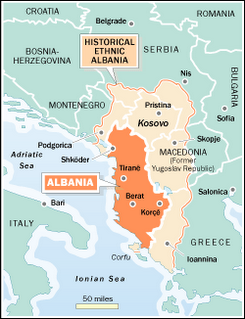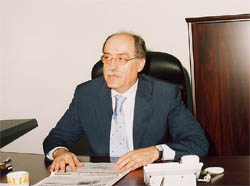 Arrest of "Terrorists" Sows Discord in Montenegro
Arrest of "Terrorists" Sows Discord in Montenegro
16 November 2006
Claim that Albanians plotted revolt ends political honeymoon with minority. By Petar Komnenic in Podgorica (Balkan Insight, 16 Nov 06)
A high profile case has cast a shadow over relations between Montenegro and its Albanian minority, since police arrested a group of Albanians on September 9 on terrorist charges.
The chief prosecutor Vesna Medenica last week said the men had set up a secret organisation, The Movement for Ethnic Albanian Rights in Montenegro, with the help of former Kosovo Liberation Army fighters, to create an autonomous Albanian region in Montenegro using force.
Medenica claimed the 14 suspects - 11 of whom are in detention, the other three are on the run - planned to carry out terrorist outrages in the mainly Albanian Malesija area using arms smuggled in from Kosovo.
Their defence lawyers deny the charges, saying the authorities lack evidence for their claims and that the suspects made incriminating statements under duress in police custody. Albanian political leaders are also sceptical.The 11 suspects in custody have been named as Anton Sinistaj, Sokolj Ivanovic, Djordje and Kolj Rok, Pjetro Dedvukaj, Djona Dedvukovic, Viktor Sinistaj, Zef Berisaj, Vaso Koljcevic, Viktor Dresevic and Maljota Bojovic. The other three are Doda Ljucaj, Vaselj Dedvukaj and Djon Ljucovic.
The Albanian community numbers about 40,000 out of a total population of about 620,000. Most live in the resort of Ulcinj, on the border with Albania, while around 12,000 live in Malesija. Many work abroad in Western Europe and the United States.
Historically, relations between the Albanians and Montenegrins are good and Albanian parties strongly supported the republic’s successful drive for separation from Serbia.Hitherto, Albanian parties have limited their demands to the field of minority rights as opposed to territorial autonomy or border changes.
Attempts to stoke separatist agitation among Albanians have fallen flat. A movement launched in 2004 to demand special status for an Albanian region including Malesija, Tuzi, Ulcinj, Plav and Gusinje drew little response. As a result, the chief prosecutor’s claim that a secret society aimed to use violence to create an Albanian region in Montenegro has caused some surprise.
In a statement last week, Medenica said that "intensive communications in the areas of Malesija, Albania and Kosovo suggested this organisation persisted in its intentions… to procure significant amounts of weapons, ammunition, military equipment and counterfeit documents, to carry out violent terrorist acts. "
In September 2006, a decision was made to launch a campaign of violence… in ….the area of Malesija, aimed at intimidating the non-Albanian population and seizing vital facilities in the Tuzi area. "Their estimate was that the most convenient moment to spring into action was immediately after the closure of polling stations on the day of parliamentary elections held on September 10."
The arrests took place in the early hours of September 9, a day before the parliamentary elections in Montenegro, when police stormed houses in Tuzi and Malesija and arrested the 14 people.
Just days after the arrests, local media reported of possible police abuse when the arrests were made. Dragan Prelevic, the lawyer for Kolj and Rok Dedvukaj, both US citizens, told Balkan Insight the allegations were "exaggerated and contrary to the collected evidence".
Prelevic said the only real evidence was a diary that the police claimed to have found in a search operation - without the presence of any independent witnesses.
"Except for the diary they have no any other piece of evidence," said Prelevic. "The fact [is] that the suspects gave their statements under torture."Vaselj Sinistaj, a deputy in parliament for Albanian Alternative, also put little faith in police allegations."Those people, some of whom I know personally, cannot possibly be terrorists," he told Balkan Insight.
"Time will tell but this has caused polarisation in Montenegro, which can be only overcome by telling the truth." Mehmet Bardhi, leader of the Montenegrin Democratic Alliance leader, agreed, saying the real problem in Montenegro was not Albanian terrorism but their marginalisation in society. "
If Albanians had all their rights, I would never have set up a political party," he said. "The democratic pursuit of political ideas ought not to be a problem, including the idea of regionalisation."Bardhi went on to say that his party did not advocate regionalisation but special status for Albanians in the territories in which they lived.
Nik Djeljosaj, former chair of the NGO Unitas, which publicly demanded regionalisation in Montenegro two years ago, said it was not terrorism but regionalism that was on trial in Montenegro. "If some people believe people should go on trial over regionalisation, they have a problem with European standards and decentralisation," he said."This is an inevitable process. The allegation that we wanted to partition Montenegro is ludicrous."
Families and lawyers of the suspects, meanwhile, accuse the police of physical and psychological abuse of the men. "During the three days spent in police custody, our clients were beaten, intimidated, insulted and denied drinking water and food," a statement from Prelevic’s office read.
Human rights activist Aleksandar Zekovic last week urged the chief prosecutor to investigate whether the police had exceeded their lawful powers in the course of the arrest operation, codenamed Eagle’s Flight. "
The state organs enjoy the support of society in their efforts to maintain and preserve constitutional order, peace and safety," he said."But this does not mean we should ignore serious objections to the actions of the police and law enforcement officers in the premises used by the police and judicial organs."
Medenica said she would look at the complaints, making it clear she regretted what she saw as attempts to undermine public faith in law enforcement."Such a public campaign has a detrimental effect on the investigation itself, inducing a public sentiment of insecurity, which is why I have estimated it is necessary to make these proceedings open to the public," she said. "
The Podgorica state prosecutor has been requested to gather up all the complaints made by the accused concerning the instances of law enforcement officers' exceeding their official powers."
Petar Komnenic is a journalist with the Podgorica weekly Monitor. Balkan Insight is BIRN`s online publication.






